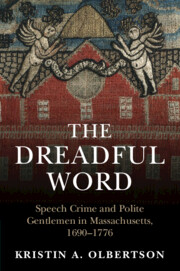6 - Cacophony
Published online by Cambridge University Press: 03 March 2022
Summary
The “vulgar,” as political actors, would play important roles in the resistance to imperial policies, and the “vulgar,” as political speech, would inform the eraʼs confrontational political dialogue. The language of protest in the 1760s and 1770s expressed political critique not only of imperial policies but also of the legal institutions and practices that promoted them. In fact, genteel cultural and political authority, which had been drawn from conduct and courtesy books and the polite coffeehouses of the metropole and extended through statutes and courtrooms, was severely tested by protest and rebellion. Under the previous regime, as politeness joined piety as a core cultural value for the Massachusetts elite, the language of statutes, prosecutions, and depositions had shifted to the rhetoric of gentility in addition to godliness. General sessions courts had imagined the portion of good social order, “the king’s peace,” that had to do with speech as a nearly exclusively masculine space governed by the metropolitan code of refinement. Prosecutions for vulgar speech had constructed a social hierarchy based in politeness, but it would not survive the Revolution intact.
- Type
- Chapter
- Information
- The Dreadful WordSpeech Crime and Polite Gentlemen in Massachusetts, 1690–1776, pp. 252 - 269Publisher: Cambridge University PressPrint publication year: 2022

